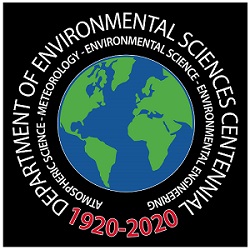
Students of the Department of Environmental Sciences, which celebrated its centennial in 2020. The Department of Environmental Sciences is home to programs of study in Environmental Sciences, Meteorology, Atmospheric Science and Environmental Engineering.
Rutgers Department of Environmental Sciences (DES) was named winner of the 2020 Governor’s Environmental Excellence Award, in the Environmental Education (Educator Led) category, at a virtual ceremony held on Dec 14. This award category recognizes “an educator, student, group of students, or class that has planned and implemented a project or program with measurable, positive environmental impacts.”
Professor Donna Fennell, who chairs the department, accepted the award on behalf of the department. The Governor’s Environmental Excellence Awards Program is New Jersey’s premier awards program for recognizing outstanding environmental performance, programs and projects throughout the state. These awards recognize individuals, businesses, institutions, communities, organizations, educators, youth and others who have made significant contributions to environmental protection in New Jersey.
 The oldest academic environmental sciences department in the U.S., DES celebrated its centennial this year. Founded in 1920 as the “Sewage Substation” by the New Jersey State Legislature, it has evolved into today’s Department of Environmental Sciences at Rutgers, serving the people of New Jersey, the nation and the world since its inception.
The oldest academic environmental sciences department in the U.S., DES celebrated its centennial this year. Founded in 1920 as the “Sewage Substation” by the New Jersey State Legislature, it has evolved into today’s Department of Environmental Sciences at Rutgers, serving the people of New Jersey, the nation and the world since its inception.
DES has educated and trained thousands of undergraduate and graduate students who now practice in the areas of water quality, wastewater treatment, remediation, soil quality, solid waste management, energy sustainability, air pollution control, meteorology and climate science. The department currently offers undergraduate and graduate programs in Environmental Sciences, Environmental Engineering, Meteorology and Atmospheric Science.
Through academic curricula, scholarly research, centers and institutes and outreach through Rutgers Cooperative Extension, DES faculty, staff and students have contributed transformative knowledge of the environment to the benefit of the people of New Jersey and beyond. As it embarks on its next century, DES will continue to embrace its core missions in scholarship, teaching and service, thereby providing guidance relevant to critical societal needs, such as the providing high quality water resources and clean air, removal of toxic contaminants from the environment, and adaptation and resiliency in the face of rapid climate change.

